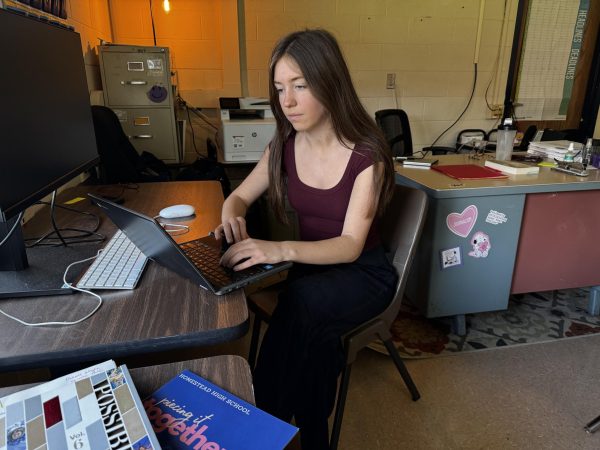Coronavirus creates uncertainty for students as well as for colleges

With the high cost of college tuition, some students and families fear that college will be unaffordable due to the impact of the coronavirus on the economy.
As college tuition continues to increase, more students look to financial aid. However, the turbulence of today’s economy leads many to question whether they can afford to fund their education.
Many students feel that college is an essential step in achieving their goals. But sending a student to college can be far too expensive for most families to finance independently and this can lead to loans that may take decades to fully repay. Lorna Collier illustrates this debt in her report, Higher Education. “Outstanding federal and private student loan debt reached a record $1.61 trillion in the second quarter of 2019, up 4.8 percent over the same quarter in 2018,” Collier said.
These figures are all pre-pandemic and with many businesses closing their doors and a massive rise in unemployment, a number of students may decide to forego or delay the traditional college experience. Harrison Prellwitz, a graduating senior at Homestead High School feels this uncertainty. “I’m not even sure if I will get the opportunity to live on campus next fall due to the pandemic,” Prellwitz said.
When asked about the potential impact, Janet Hathaway, an Associate Dean at Northern Illinois University, felt it may be difficult to predict. “I think that the impact on enrollment is hard to speculate about given all the uncertainty. But I suspect people are more likely to stay closer to home. They might delay college. They might go part-time,” Hathaway said.
Michael Alexander, Chancellor at the University of Wisconsin-Green Bay, believes enrollment numbers will differ based on how well the college is serving the needs of their students. “Typically enrollment in higher education goes up when the economy struggles, but I think that correlation will become less connected in the future. I think institutions that can provide access to education in ways that students want will thrive,” Alexander said.
Alexander’s statement illustrates how important it will be for institutions of higher education to transform in order to meet the needs of their students. Similarly, in a recent New York Times article, Hans Taparia states that colleges should actually take advantage of the pandemic as a new opportunity.
“Up until now, online education has been relegated to the equivalent of a hobby at most universities. With the pandemic, it has become a backup plan. But if universities embrace this moment strategically, online education could expand access exponentially and drop its cost by magnitudes — all while shoring up revenues for universities in a way that is more recession-proof, policy-proof and pandemic-proof,” Taparia said.
Regardless of what college looks like in the coming years or the path a student chooses, there is certain to be tuition involved. So what should students do to prepare? “Becoming financially literate is crucial. Any prospective college student should seek out financial literacy training and opportunities… The bare minimum is loan counseling, for people who need to take out loans. People may not realize they do not need to take out the full loan amount,” Hathaway said.
Many aspects can influence what types of aid are available to students. Alexander also stated the importance of exploring these many programs with someone well-versed in this area.
“Every student has a unique financial situation. I think it is most important to discuss your options for tuition support with a Financial Aid expert at the school you are looking at attending. Depending on your situation and the cost of attendance at the school, there may be many different kinds of aid available to you,” Alexander said.
Families may also be worried about undertaking this financial burden in such an uncertain time. However, students should remember that financial resources are not only available as they enter their freshman year, but at many points along their path. Hathaway stresses the importance of staying connected with those that can help.
“Ask, ask, ask! This is the advice I give to students most often. If I find out that a current student is in need, I would then tell them who all to contact, connect with my own sources, and basically ask the village to see what we could do to help. If I don’t know someone is in need, I can’t help them,” Hathaway said.
The coronavirus pandemic is not only presenting economic challenges to families, but to colleges as well. “Even before coronavirus hit, higher education was entering a financial crisis,” Claire Bond Potter of the New York Times said. Now that we are in the midst of a recession, many worry that tuition may need to increase further in order to raise revenue.
So how will we meet the needs of families and keep institutions of higher education fiscally sound? “Public colleges and universities should be truly public and tuition-free; private ones, a crucial and longstanding resource, should be discounted by the cost of a public education. Federal loans should be generous, interest-free and forgivable, perhaps in exchange for national service,” Potter said.
Democratic presidential candidates have also often suggested implementing free college programs, whether tuition-free (where only the cost of tuition is covered) or debt-free (where other expenses are covered as well). Programs like this have already been put into place in Tennessee and New York.
However, the burden of funding these programs lands on the shoulders of the taxpayers. College is not truly “free” seeing as one will need to fund these programs once she or he is out of college and part of the workforce. This debate is certain to continue.
There is still much uncertainty about how college will look in the near future and there is no immediate answer to how the economy will change once the country returns to normalcy. All of the unknowns underscore the importance of high school seniors remaining informed. It will be crucial to consider all options carefully and choose the college that is the best fit in all aspects of the decision-making process.

Ainsley Feigles is a senior at Homestead High School. She has always had a passion for writing and is enjoying spending her second year with Highlander...










